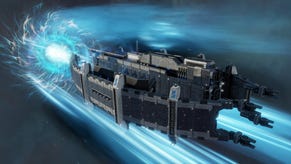The Fallout TV show has revived an ancient argument about Vault Boy's thumb
Look to windward
Last week I went to a screening of Amazon and Bethesda's Fallout TV show, a spin-off yarn starring Ella Purnell (who voiced Jinx in the Arcane Netflix adaptation) as a recently surfaced Vault Dweller, scouring the irradiated wastelands for [SPOILERS REDACTED]. It's early days, but the show's first two episodes didn't make a massive impression on me, though I will concede that the sight of Amazon's branding on Fallout's infamous Please Stand By emergency broadcast titlecard makes a dangerous amount of sense.
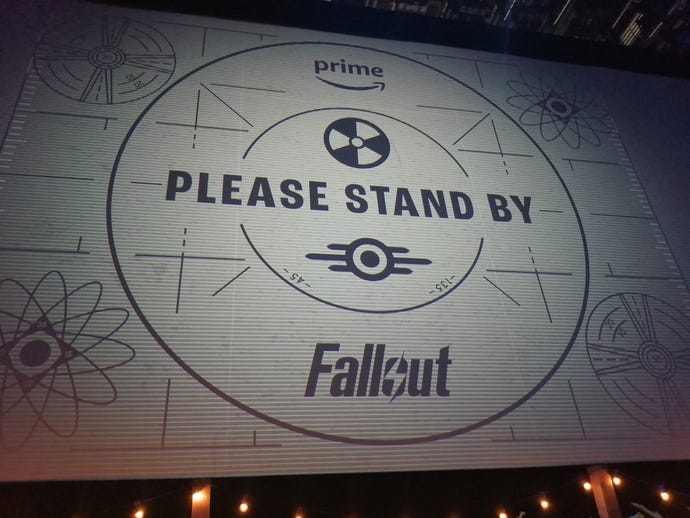
As with the company's Rings Of Power adaptation of Lord Of The Rings, it's a design-by-committee assemblage of fan-favourite props and fittings, all recreated in flat, bright, HD-optimised shades that felt as sterile as the mocked-up Vault interior our screening took place in. That feeling of falseness makes sense within the artificial confines of a Vault, of course, but it defines the show's above-ground scene-setting as well. The plot also screws up what is arguably the best moment in any Fallout game - cracking the Vault's seal and seeing a ravaged post-nuclear Earth for the first time. Its parallel storytelling cuts to one above-ground location well before Purnell's Lucy MacLean bids Vault 33 goodbye, ruining the suspense.
Still, there's some excitement in the shape of Aaron Moten's Maximus, a rapidly disillusioned Brotherhood Of Steel trainee, and Walton Goggins's The Ghoul, a figure from before the Fall who is as good at gunslinging as he is chewing the scenery. And there's intrigue in the fact that the Fallout TV show has absent-mindedly resurfaced an argument between Fallout players and fans that goes back years. Before I get to that, though, here are some thoughts from Bethesda boss Todd Howard.
There was a very rehearsed group Q&A after the screening, in which Howard mostly sat quietly while the cast enthused about things like wearing Brotherhood Of Steel power armour on set. Towards the end, the host threw Howard and videogames journalists a bone by asking how it felt to watch the show as official Fallout uncle, and is there anything here that might show up in a Fallout game - dare we utter the magic words, Fallout 5? "Well, I think the main way we approached this was to do something new, you know - treat it like we do with each game where we want to tell an original story, find some good geography," Howard replied. "I say that the main character in all of the Fallout games and everything we've done is the world itself. And so being able to work with all of these people, and tell a new story, about what would the next chapter be and moving it forward."
"You know, as I think about the franchise, the one thing the show is able to do that we were really never able to do in the games and the ways that we would have loved, is to show so much of the past, because that's one of the things that really makes the world of Fallout special," he went on. "And the way the show mines that with [Walton Goggins's] character, and the other things that occur in the past, filling in all those things with Vault-Tec - I don't want to give any spoilers, but they just did so many great things. And the way we discussed it, there was so much to mine there in the franchise, that would be both additive to it and also really, really special, if you're already a fan of the series."
In practice, the Fallout TV show doesn't just excavate the Fallout world's past. It also, perhaps not quite intentionally, digs into the history of how that universe has been interpreted and misread by players since the late 90s. If you're a properly pickled Fallout fan, the most risible part of the first episode might be the opening, which treats us to a snapshot of life just before the apocalypse. In the process, two characters make reference to the supposed US military advice that if you see a mushroom cloud, you should gauge its height against your thumb. If your thumb appears taller than the cloud, you still have time to run for it. Fallout's Vault Boy mascot, a parody of relentlessly upbeat 50s Cold War propaganda, is commonly pictured winking at his own elevated thumb, which the show implies is designed to illustrate the above rule. Hah, what a nice piece of trivia, I thought to myself. But then I innocently brought it up in the next morning meeting with the other RPS editors, and well, Several People Were Typing.
I probably should have known this as a fairly seasoned pre- and post-Bethesda-acquisition Fallout player, but it turns out people have been arguing about Vault Boy's thumb since the days of the original Black Isle and Interplay CRPGs. The association with measuring mushroom clouds is apocryphal. It has been repeatedly debunked: in 2013, former Interplay head of development Brian Fargo told the Twitterers that "the vault boy simply has a positive attitude". In 2015, Vault Boy's artist Trammel Ray Isaac reiterated that "it's got nothing to do with measuring the cloud". Nonetheless, the claim keeps resurfacing, in what I consider a mildly interesting show of how history may be cancelled and overwritten even in the absence of, say, a worldwide nuclear exchange.
I guess the basic takeaway here is that cool ideas endure. Vault Boy simultaneously encouraging the viewer while cheerily angling his thumb over your shoulder at an exploding nuclear bomb is a cool idea, one that entirely suits Fallout's brand of satire. I'm kind of aghast that Fargo and Isaac haven't pretended that it was the intended reading all along - I know I would. I'm also maliciously looking forward to the, haha, fallout when e.g. top influencers who are new to the universe start posting thumbs-up selfies with a #pleasestandby caption and are immediately set upon by wizened Black Isle fans, like ghouls swarming Vault Dwellers as they step into the sun.
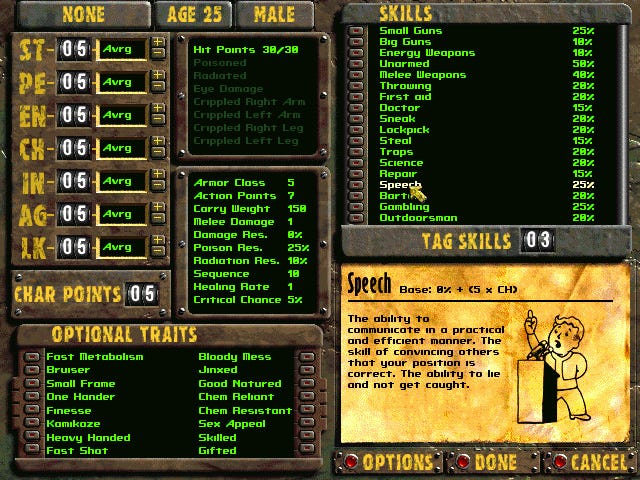
Another reason Fallout's made-up rule-of-thumb might have stayed the test of time is that it sounds like solid advice. Or at least, compact and memorable advice: if I see a mushroom cloud, you can bet your arse I want some straightforward, intuitive guidelines to follow other than "die immediately". Unfortunately, it doesn't make sense even outside the world of Fallout. As Inverse reported in 2016, citing both the US Department of Energy and the Conference of Radiation Control Program Directors in Frankfurt, your thumb being bigger than the mushroom cloud reveals little in practice. The Fallout TV show itself gently disproves the maxim by having one character ask another whether it still applies if you have a smaller thumb.
The Inverse article does, however, leave room for another interpretation, one that I will now gleefully hand forward to the next generation of players and journalists arguing about Fallout lore. Two of the researchers quoted point out that wind direction is of vital importance when fleeing an atomic blast - if you're downwind, all that icky radiation will come down squarely on your head, making it far more sensible to find shelter than flee. Perhaps, then, what Vault Boy is really doing with his thumbs-up is testing the wind? There we go, the seed has been sown. Let's pick this conversation up again when Fallout 5 releases in 10 years time and/or in the aftermath of an actual nuclear war.
Season one of Fallout launches on Prime Video from April 11th.
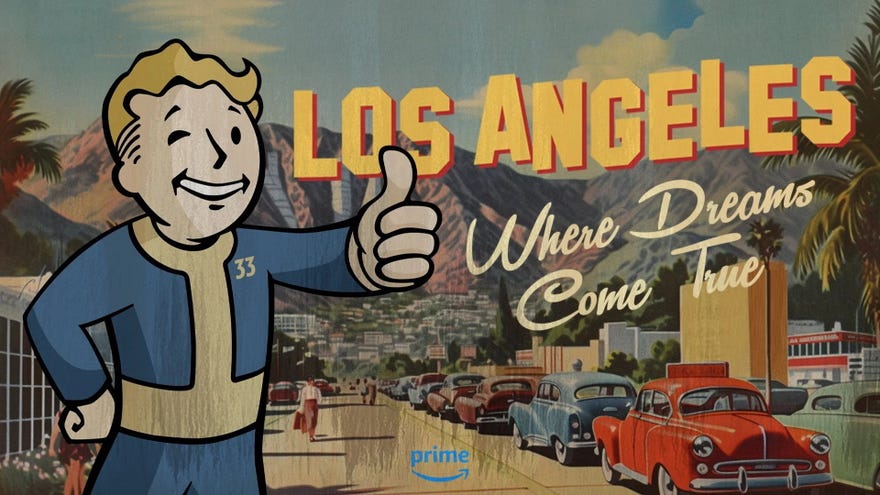


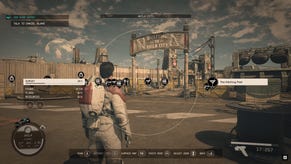
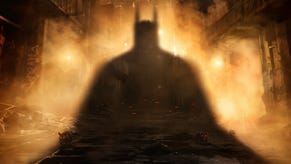
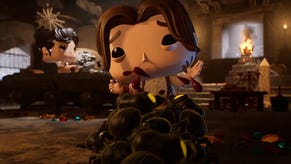
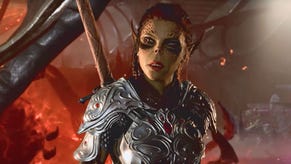
.jpg?width=291&height=164&fit=crop&quality=80&format=jpg&auto=webp)
